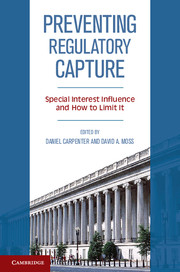Book contents
- Frontmatter
- Contents
- List of Figures
- List of Tables
- Editors
- Contributors
- Preface
- Acknowledgments
- Introduction
- Section I Failures of Capture Scholarship
- Section II New Conceptions of Capture – Mechanisms and Outcomes
- 4 Cultural Capture and the Financial Crisis
- 5 Complexity, Capacity, and Capture
- 6 Preventing Economists’ Capture
- 7 Corrosive Capture? The Dueling Forces of Autonomy and Industry Influence in FDA Pharmaceutical Regulation
- Section III Regulatory Case Studies
- Section IV The Possibility of Preventing Capture
- Conclusion
- Afterword
- Index
- References
4 - Cultural Capture and the Financial Crisis
Published online by Cambridge University Press: 05 June 2014
- Frontmatter
- Contents
- List of Figures
- List of Tables
- Editors
- Contributors
- Preface
- Acknowledgments
- Introduction
- Section I Failures of Capture Scholarship
- Section II New Conceptions of Capture – Mechanisms and Outcomes
- 4 Cultural Capture and the Financial Crisis
- 5 Complexity, Capacity, and Capture
- 6 Preventing Economists’ Capture
- 7 Corrosive Capture? The Dueling Forces of Autonomy and Industry Influence in FDA Pharmaceutical Regulation
- Section III Regulatory Case Studies
- Section IV The Possibility of Preventing Capture
- Conclusion
- Afterword
- Index
- References
Summary
In 1992, Barbara Smiley, a resident of California, sued Citibank, alleging that it violated California law by charging late fees to her credit card account. During the litigation, the Office of the Comptroller of the Currency (OCC) – the primary regulator for national banks such as Citibank – issued a proposed regulation specifying that late fees were “interest”; under federal law, this meant that Citibank was bound solely by the law of the state where its credit card subsidiary was situated – South Dakota. When the case was appealed to the Supreme Court, twenty-five states and several consumer organizations signed onto briefs supporting Smiley; fifteen states, the American Bankers Association, and the OCC supported Citibank. The Supreme Court ruled for Citibank, deferring to the OCC. The Court acknowledged but discarded the fact that the OCC seemed to have issued the regulation because of the ongoing litigation, endorsing the ability of a federal agency to issue regulations to sway pending litigation in favor of the companies it supervised.
The OCC's intervention in Smiley v. Citibank was just one part of a sweeping campaign to lift constraints on national banks, allowing them to enter new businesses while blocking efforts by states to rein them in. The OCC, in turn, was just one of several federal agencies that spent most of the past two decades fulfilling the wishes of different segments of the financial sector. The Federal Reserve issued a series of decisions enabling banks to expand into the securities business and later declined to enforce consumer protection statutes against the nonbank subsidiaries of bank holding companies. All four major banking agencies (the Federal Reserve, the OCC, the Office of Thrift Supervision [OTS], and the Federal Deposit Insurance Corporation [FDIC]) relaxed the capital requirements governing structured financial products, enabling banks to ramp up their securitization businesses without setting aside large amounts of capital.
- Type
- Chapter
- Information
- Preventing Regulatory CaptureSpecial Interest Influence and How to Limit it, pp. 71 - 98Publisher: Cambridge University PressPrint publication year: 2013
References
- 81
- Cited by

